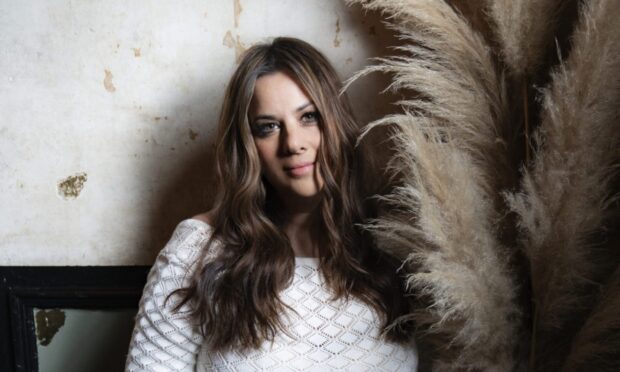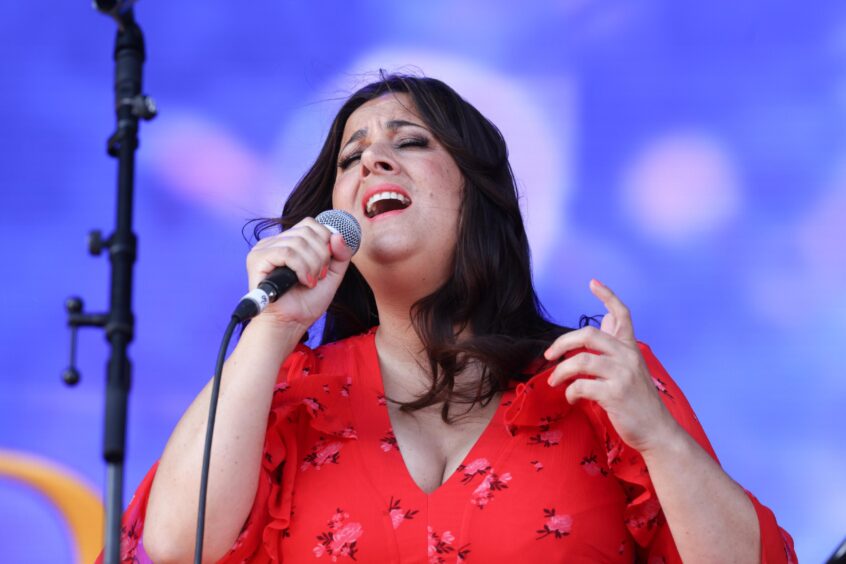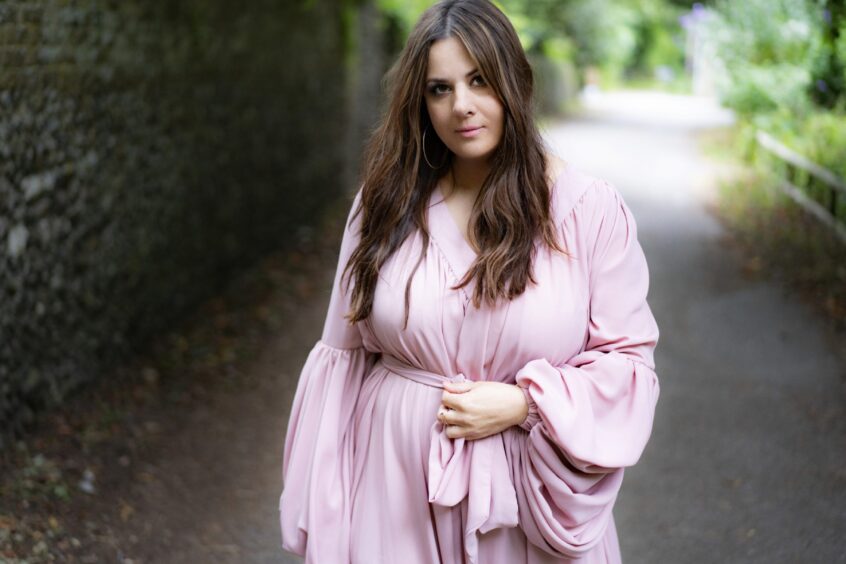
When Rumer looks back at her childhood, some of the memories now seem dark. But there was one thing that was sure to, quite literally, add a touch of Technicolor.
“When I think back to my first musical love, it was the Technicolor movie musical,” she said.
“They transported me away from a difficult reality at the time. I always thought that was what music was for and I think that’s why there’s a dreaminess to the way I write. It’s transportive.”
Singer Rumer, born Sarah Joyce, is the youngest of seven children, born in Pakistan in 1979. When her parents split five years later, her mother took her and her siblings to England.
“Back then, there was no such thing as a DVD player and you could get very little on video, so I would sit with the newspaper and lay in wait to record whatever old movie was on BBC2 on a Sunday afternoon,” Rumer continued.
“I loved any Judy Garland film, especially Till the Clouds Roll By, which had that dream sequence. I remember a new kid moving into our neighbourhood and she had a massive house with this enormous television. I took over my video tape of Till the Clouds Roll By, thinking the other kids would love it. They didn’t get it.
“They were nouveau riche, her dad wore a pinstripe suit and had a moustache and drove a Bentley, and they had these giant swans. I thought it was the perfect place to watch the film, but everyone just walked out of the room.”
Rumer’s world was thrown off-kilter again when her mother, then dying with cancer, revealed that her birth father was actually the family’s Pakistani chef. When she returned to the country in an effort to track him down, she was met with the news that he had died just before she arrived.
Even as she grew up, Rumer said she found herself becoming more and more isolated, her focus resting on her music rather than on maintaining relationships.
Though she is now joyously celebrating the 15th anniversary of her debut album, Seasons of My Soul, she acknowledges how much life has changed since she wrote it.
“I was very unstable when I wrote that music,” said Rumer.
“I was in my 20s, my mother had just died, I had lots of minimum-wage jobs and was living on the breadline. For a decade I was writing on a piece of paper how I was going to pay the bills, juggling pennies.
“I didn’t have time for a social life or relationships, all I had the energy for was to go to work, pay my bills and go to the studio. That’s all I did for 10 years.
“I was focused on getting my music out there. It was only when the record was successful that I started looking around and realising I had neglected relationships. I was getting to my 30s and thinking I might want to have a family of my own, so I have been putting those things in place over the last 15 years.”
Released in 2010, Seasons of My Soul became one of the biggest-selling albums of the decade, shifting more than a million copies worldwide.
It led to Rumer being nominated for the Brit awards for Best British Female Singer and Best British Breakthrough Act the following year.
She has collaborated with Burt Bacharach, Elton John, Daryl Hall and Jools Holland, and performed at the White House.
After a turbulent start to life, Rumer said she used music – specifically Seasons of My Soul – as a form of “self-medication”, even if she didn’t realise it at the time.
“Writing was me trying to find a sane voice in a difficult time,” she explained.
“Come to Me High was composed when I was very depressed. I was stuck in this spiral where I couldn’t remember what it was like to be OK.
In the lyrics ‘I see you there locked in a mood, just like the sun, can’t touch the moon’, the sun is being OK and the moon is depression. They don’t touch each other.
“If I imagined a choir of angels, what would they say? ‘Come to me high, come to me restless, come to me cold, come to me helpless’. I was using my imagination to heal.
“I didn’t actually know that I had any mental health issues at all, so at that time music was my only way of comforting myself. When people say they get comfort from it, I think that’s because I meant it that way.”
Rumer still isn’t fond of the fame and attention that often come hand in hand with musical success, but she has learned how to distance herself from it by establishing boundaries around her private life. She wondered how different things would have been if she were starting out now.
“I wore an emotional short skirt back then,” she said.
“I was doing myself a disservice in that I was open and talking about everything, but a lot of the time when I spoke to journalists it was a stitch-up. What was a heartfelt discussion about mental health would be taken and twisted to make it look like I was crazy.
“Things did shift in relation to the media’s approach to mental health and, ever since, people are able to talk about it and not be met with horror like I was.
“I don’t mind talking about it now, I actually like the fact that we are in a climate where it is good and important to talk about mental health.
“We all know someone who is suffering, there is a whole spectrum of issues.
“I felt a little bit like I had said too much and exposed my vulnerabilities then didn’t get the support in return that I probably would get if I was opening up about it now. It just wasn’t the climate to talk about mental health when I was doing so.”
Rumer is now married with a son. And she has reimagined her most famous album with Redtenbacher’s Funkestra, maintaining the velvety timbre she is known for.
Come October, she will embark on a UK tour – joined by a full band – to perform Seasons of My Soul alongside fan favourites from the albums that followed. But while many people still listen to her debut album 15 years later, she never has.
“Since I handed in Seasons of My Soul, I have not sat and listened to it all the way through,” Rumer said.
“I have heard it in cafes and through speakers, but I haven’t sat down and listened to it. That is partly because I don’t want to hear any mistakes, and I think that is normal once people have put a project out into the world, they move on.
“But it’s amazing that it has been that long and that, for a lot of people, the album is still on rotation in their houses and cars.
“I always wanted to make a record that would stand the test of time and the only way to really do that is to give it that time. I am really proud.”
‘I’m just doing my own thing’
Rumer’s voice is distinctive, but that hasn’t stopped her from experimenting with different styles when writing music.
She explained how she lets a genre reveal itself while she is writing.
“I have done some incremental moves, like when I moved to America I did a country album called Nashville Tears,” she said.
“I still like the traditional pop format though. I will do whatever serves the song.
“When I wrote Dangerous it felt disco, so I thought: ‘Well, I guess this is going to be disco.’ The song will be what it wants to be.
“My taste is sophisticated, so if I am doing pop music it’ll be sophisticated pop music. I have never been interested in following pop trends.
“In the beginning I think people thought I was middle of the road, but I thought that was cool.
“Easy listening is cool, background music is cool, and people are getting on board with that now, they want music for atmosphere.
“I’m glad I did my own thing, I have been doing that for years and those that appreciate it do, and if it’s not for everyone, that’s fine.
“I am not trying to be anyone big, I don’t want to be a big star. I just want to make good music and do the best I can with the gifts I’ve been given.”
Tickets for Rumer’s 15th anniversary tour celebrating Seasons of My Soul, including her show on October 14 at the Pavilion Theatre in Glasgow, are available from ticketline.co.uk and ticketmaster.co.uk

Enjoy the convenience of having The Sunday Post delivered as a digital ePaper straight to your smartphone, tablet or computer.
Subscribe for only £5.49 a month and enjoy all the benefits of the printed paper as a digital replica.
Subscribe © Hogan/Hogan Media/Shutterstock
© Hogan/Hogan Media/Shutterstock © Dan Curwin
© Dan Curwin